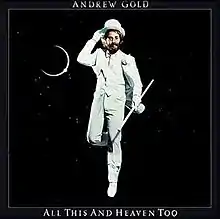All This and Heaven Too (album)
All This and Heaven Too is the third album by singer-songwriter Andrew Gold, released in 1978 on Asylum Records. It includes the hit singles "Never Let Her Slip Away" (a no. 5 entry on the UK Singles Chart) and "Thank You for Being a Friend" (a no. 25 entry on the Billboard singles chart).[4]
| All This and Heaven Too | ||||
|---|---|---|---|---|
 | ||||
| Studio album by | ||||
| Released | April 15, 1978 | |||
| Recorded | The Sound Factory, Los Angeles | |||
| Genre | Pop, pop rock | |||
| Length | 41:04 | |||
| Label | Asylum | |||
| Producer | Andrew Gold, Brock Walsh | |||
| Andrew Gold chronology | ||||
| ||||
| Singles from All This and Heaven Too | ||||
| ||||
| Review scores | |
|---|---|
| Source | Rating |
| AllMusic | |
| Christgau's Record Guide | C−[2] |
| Encyclopedia of Popular Music | |
Background
All This and Heaven Too reached the British Top Five in the albums chart in 1978. "Thank You for Being a Friend" later gained popularity as the theme song for The Golden Girls, though it was performed by Cynthia "Cindy" Fee, a singer who often recorded advertising jingles, for the show. Gold also became known for his biggest UK hit song, "Never Let Her Slip Away," which was a No. 5 chart hit in the UK; Freddie Mercury assisted Gold as an uncredited background singer on the track.[5]
Track listing
All songs written by Andrew Gold, except where noted.
| No. | Title | Writer(s) | Length |
|---|---|---|---|
| 1. | "How Can This Be Love" | Mark Safan, Mark Goldenberg | 4:01 |
| 2. | "Oh Urania (Take Me Away)" | 4:22 | |
| 3. | "Still You Linger On" | 3:21 | |
| 4. | "Never Let Her Slip Away" | 3:29 | |
| 5. | "Always for You" | 4:37 | |
| 6. | "Thank You for Being a Friend" | 4:41 | |
| 7. | "Looking for My Love" | 3:39 | |
| 8. | "Genevieve" | Gold, Brock Walsh | 5:05 |
| 9. | "I'm on My Way" | Mark Safan | 3:41 |
| 10. | "You're Free" | 4:08 |
| No. | Title | Writer(s) | Length |
|---|---|---|---|
| 1. | "Gambler" | Kenny Edwards | 3:55 |
| 2. | "Thank You for Being a Friend" (outtake) | 1:33 | |
| 3. | "Dr. Robert" (live at the Roxy, Los Angeles, CA, 1978) | John Lennon, Paul McCartney | 3:18 |
| 4. | "Genevieve" (instrumental) | Gold, Brock Walsh | 5:41 |
| 5. | "Still You Linger On" (instrumental) | 4:50 |
Charts
| Chart (1978) | Peak position |
|---|---|
| Australian (Kent Music Report)[6] | 83 |
Personnel
- Andrew Gold – lead vocals, backing vocals (1, 2, 4, 6, 9, 10), acoustic piano (1, 2, 3, 5, 6, 8, 9, 10), guitar solo (1), percussion (1, 4, 5, 6, 9, 10), clavinet (2), synthesizers (2, 4, 6), guitars (3, 5, 7, 8, 10), electric piano (7, 8, 10), harmonium (7), timpani (7), bass (8), drums (8), acoustic guitar (9), lead guitar (9)
- Waddy Wachtel – guitars (1, 6), electric rhythm guitar (9)
- Kenny Edwards – bass (1, 5, 6, 9), backing vocals (6)
- Leland Sklar – bass (2)
- Brad Palmer – bass (10)
- Rick Marotta – drums (1)
- Russ Kunkel – drums (2)
- Jeff Porcaro – drums (5, 6, 9)
- Beau Segal – drums (10)
- Stix Akimbo – percussion (8)
- Ernie Watts – saxophone (4)
- David Campbell – string and woodwind arrangements, conductor
- Brock Walsh – backing vocals (1, 4, 6, 9, 10), percussion (4)
- J. D. Souther – backing vocals (4)
- Mark Safan – backing vocals (9)
- Jennifer Warnes – backing vocals (9)
Production
- Andrew Gold – producer
- Brock Walsh – co-producer
- Dennis Kirk – engineer
- Greg Ladanyi – engineer
- Peter Granet – recording (8)
- George Ybarra – assistant engineer
- Bernie Grundman – mastering
- A&M Studios (Hollywood, California) – mastering location
- Melanie McDowell – production assistant
- John Kosh – art direction, design
- David Alexander – cover photography
- Charles William Bush – sleeve photography
- Norman Epstein – management
References
- Chrispell, James. All This & Heaven Too at AllMusic. Retrieved November 30, 2014.
- Christgau, Robert (1981). "Consumer Guide '70s: G". Christgau's Record Guide: Rock Albums of the Seventies. Ticknor & Fields. ISBN 089919026X. Retrieved February 24, 2019 – via robertchristgau.com.
- Larkin, Colin (1999). The Virgin Encyclopedia Of Popular Music, Concise 3rd Edition, p. 538. Virgin Books, London. ISBN 1-85227-832-3
- Whitburn, Joel (2000). The Billboard Book of Top 40 Hits, 7th Edition, p. 267. Billboard Books, New York. ISBN 0-8230-7690-3
- Freddie Mercury provided uncredited backing vocals per these sources:
- "Top 500". Smooth Radio. Archived from the original on 10 April 2015. Retrieved 2 September 2016.
- Sweeting, Adam. Andrew Gold obituary. The Guardian. June 6, 2011. Retrieved September 15, 2011.
- "Never Let Her Slip Away". Johnnie Walker's Sounds of the 70s. BBC Radio 2. 5 Feb 2012.
- O'Neal, Sean. R.I.P. Andrew Gold, songwriter of "Lonely Boy" and The Golden Girls theme. The A.V. Club. June 6, 2011. Retrieved August 14, 2013.
- Singer/Songwriter Andrew Gold Dies. Contactmusic. June 6, 2011. Retrieved September 15, 2011.
- Drive with Russell Woolf; Andrew Gold - Lonely Boy Archived 2013-03-10 at the Wayback Machine. Australian Broadcasting Corporation. June 16, 2011. Retrieved August 14, 2013.
- Kent, David (1993). Australian Chart Book 1970–1992 (illustrated ed.). St Ives, N.S.W.: Australian Chart Book. p. 127. ISBN 0-646-11917-6.